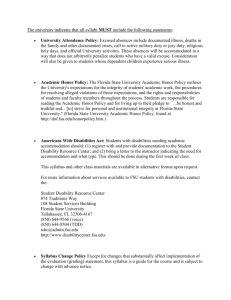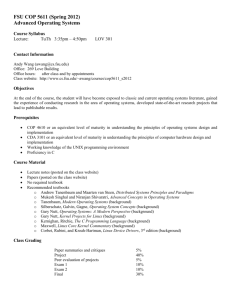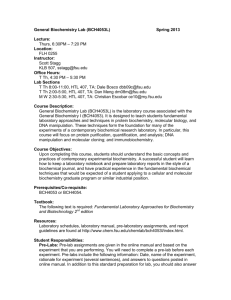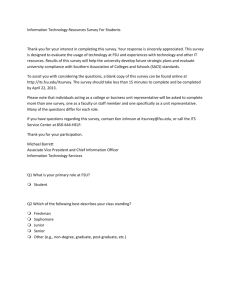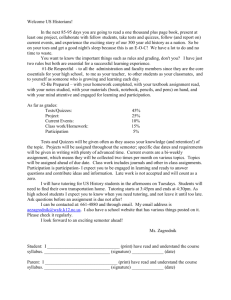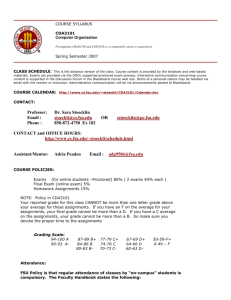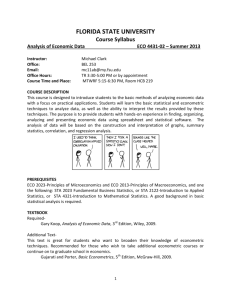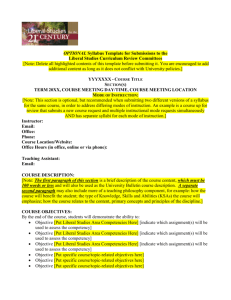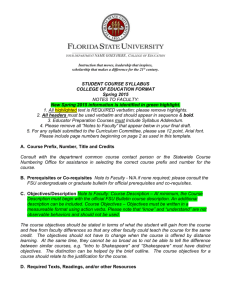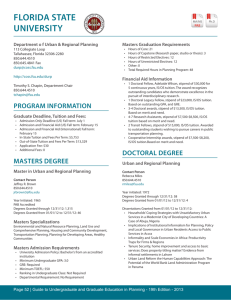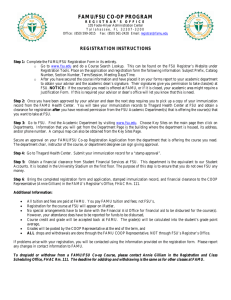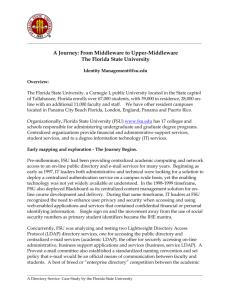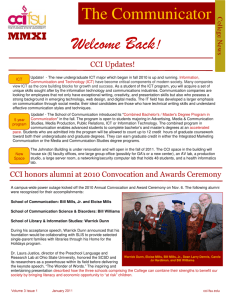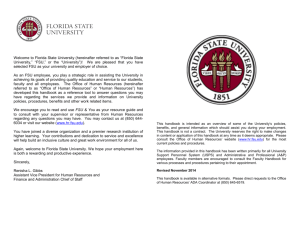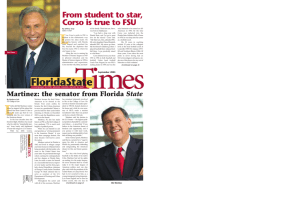Syllabus - Alice Ellyson
advertisement
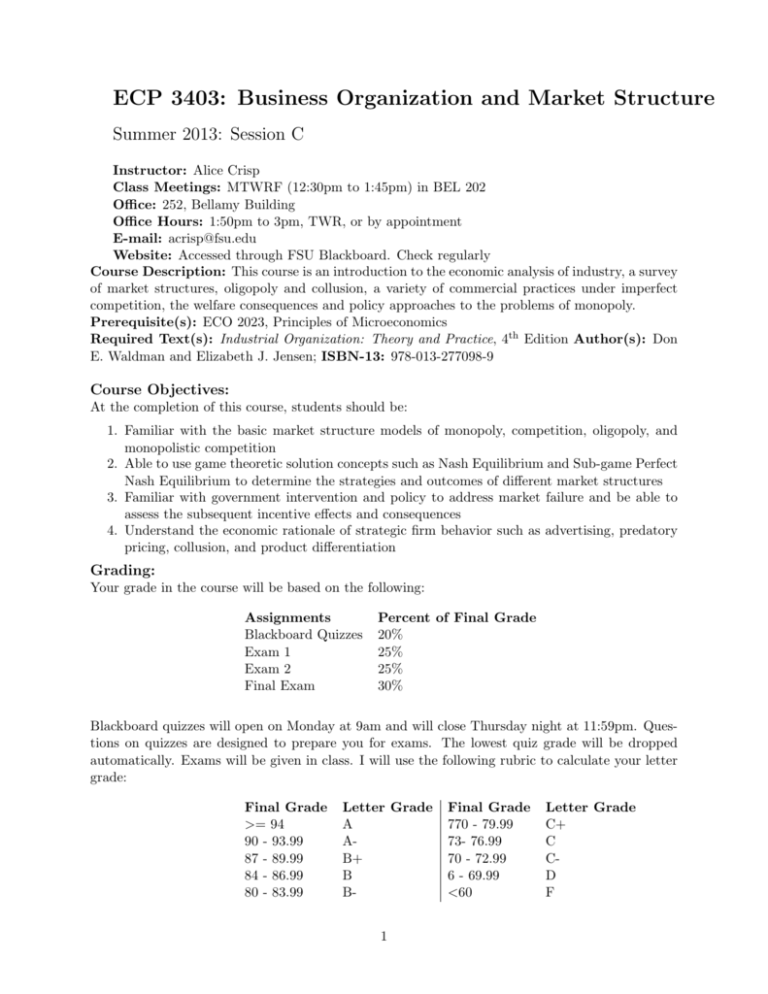
ECP 3403: Business Organization and Market Structure Summer 2013: Session C Instructor: Alice Crisp Class Meetings: MTWRF (12:30pm to 1:45pm) in BEL 202 Office: 252, Bellamy Building Office Hours: 1:50pm to 3pm, TWR, or by appointment E-mail: acrisp@fsu.edu Website: Accessed through FSU Blackboard. Check regularly Course Description: This course is an introduction to the economic analysis of industry, a survey of market structures, oligopoly and collusion, a variety of commercial practices under imperfect competition, the welfare consequences and policy approaches to the problems of monopoly. Prerequisite(s): ECO 2023, Principles of Microeconomics Required Text(s): Industrial Organization: Theory and Practice, 4th Edition Author(s): Don E. Waldman and Elizabeth J. Jensen; ISBN-13: 978-013-277098-9 Course Objectives: At the completion of this course, students should be: 1. Familiar with the basic market structure models of monopoly, competition, oligopoly, and monopolistic competition 2. Able to use game theoretic solution concepts such as Nash Equilibrium and Sub-game Perfect Nash Equilibrium to determine the strategies and outcomes of different market structures 3. Familiar with government intervention and policy to address market failure and be able to assess the subsequent incentive effects and consequences 4. Understand the economic rationale of strategic firm behavior such as advertising, predatory pricing, collusion, and product differentiation Grading: Your grade in the course will be based on the following: Assignments Blackboard Quizzes Exam 1 Exam 2 Final Exam Percent of Final Grade 20% 25% 25% 30% Blackboard quizzes will open on Monday at 9am and will close Thursday night at 11:59pm. Questions on quizzes are designed to prepare you for exams. The lowest quiz grade will be dropped automatically. Exams will be given in class. I will use the following rubric to calculate your letter grade: Final Grade >= 94 90 - 93.99 87 - 89.99 84 - 86.99 80 - 83.99 Letter Grade A AB+ B B1 Final Grade 770 - 79.99 73- 76.99 70 - 72.99 6 - 69.99 <60 Letter Grade C+ C CD F Course Policies: • Academic Honesty: In addition to the Florida State University Academic Honor Policy (see below), I have the following expectations for academic honesty in this course: – Students may not give or receive any assistance in the preparation of any work without authorization by the instructor. – Students must clearly establish authorship of work. Referenced work must be clearly documented, cited, and attributed, regardless of media or distribution. Even in the case of work licensed as public domain, the student must provide attribution of that work in order to uphold the standards of intent and authorship. – Discussion amongst students is encouraged, but when in doubt, direct your questions to the professor, tutor, or lab assistant. – No late assignments will be accepted under any circumstances. • Attendance and Make-up Policy – Attendance is not a part of your course grade. However, keep in mind that regular attendance is highly correlated with course performance. – Students are responsible for all missed coursework, regardless of the reason for absence. It is also the absentee’s responsibility to get all missing notes or materials. – Make-ups for quizzes and exams will not be given except in cases deemed acceptable by the University Attendance Policy (See below) – If you miss Exam 1 or Exam 2 for any reason, the weight of those exams will be shifted to the final exam. – The final exam is mandatory. In the event that you cannot sit for the final exam, please notify me in advance so arrangements can be made. University Attendance Policy: Excused absences include documented illness, deaths in the family and other documented crises, call to active military duty or jury duty, religious holy days, and official University activities. These absences will be accommodated in a way that does not arbitrarily penalize students who have a valid excuse. Consideration will also be given to students whose dependent children experience serious illness. Americans with Disabilities Act: Students with disabilities needing academic accommodation should: (1) register with and provide documentation to the Student Disability Resource Center; and (2) bring a letter to the instructor indicating the need for accommodation and what type. This should be done during the first week of class. This syllabus and other class materials are available in alternative format upon request. For more information about services available to FSU students with disabilities, contact the: Student Disability Resource Center 874 Traditions Way 108 Student Services Building Florida State University Tallahassee, FL 32306-4167 (850) 644-9566 (voice) (850) 644-8504 (TDD) (850) 644-7164 sdrc@admin.fsu.edu http://www.disabilitycenter.fsu.edu/ 2 Academic Honor Policy: The Florida State University Academic Honor Policy outlines the University’s expectations for the integrity of students’ academic work, the procedures for resolving alleged violations of those expectations, and the rights and responsibilities of students and faculty members throughout the process. Students are responsible for reading the Academic Honor Policy and for living up to their pledge to ...be honest and truthful and ... [to] strive for personal and institutional integrity at Florida State University.” (Florida State University Academic Honor Policy, found at http://dof.fsu.edu/honorpolicy.htm) Free Tutoring from FSU: On-campus tutoring and writing assistance is available for many courses at Florida State University. For more information, visit the Academic Center for Excellence (ACE) Tutoring Services comprehensive list of on-campus tutoring options - see http://ace.fsu.edu/tutoring or contact tutor@fsu.edu. High-quality tutoring is available by appointment and on a walk-in basis. These services are offered by tutors trained to encourage the highest level of individual academic success while upholding personal academic integrity. Syllabus Change Policy: Except for changes that substantially affect implementation of the evaluation (grading) statement, this syllabus is a guide for the course and is subject to change with advance notice. Data for Research Disclosure: Any and all results of in-class and out-of-class assignments and examinations are data sources for research and may be used in published research. All such use will always be anonymous. 3 Tentative Course Outline: This weekly schedule may change as it depends on the progress of the class. Week Content, Text Chapters Week 1 • Introduction, Firm Cost Structure, Perfect Competition, Perfect Monopoly • Chapters 1, 2, 3 • Quiz 1 - due by 11:59pm Saturday, June 29 Week 2 • Natural Monopoly, Dominant Firm/Competitive Fringe, Contestable Markets • Chapter 5 • Exam 1 - Wednesday, July 3 in class Week 3 • Game Theory, Cournot Model, Bertrand Model, Stackelberg Model • Chapters 7, 8 • Quiz 2 - due by 11:59pm Thursday, July 11 Week 4 • Collusion, Cartels • Chapters 9, 10 • Exam 2 - Friday, July 19 in class Week 5 • Predatory Pricing, Product Differentiation, Advertising • Chapters 11, 13, 14 • Quiz 3 - due by 11:59pm Thursday, July 25 Week 6 • Price Discrimination, Antitrust, Regulation • Chapters 16, 18 • Final Exam - Friday, August 2 in class 4
